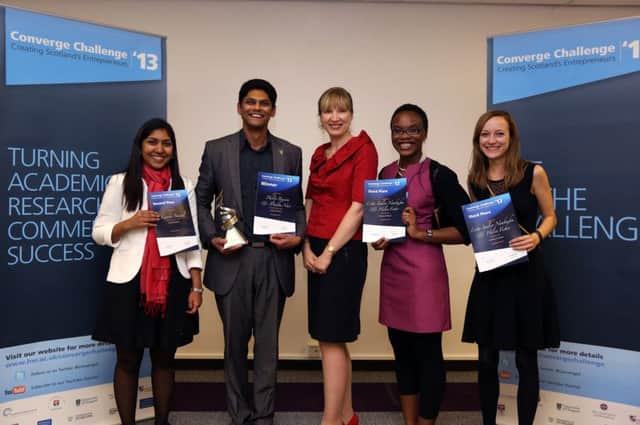Not everyone has to create a company


WE are regularly told entrepreneurs are risk-takers and the natural role for them is to form a company. This is based on their core belief that their idea is going to have a profound impact that enriches the lives of others with a product or services.
However, internal research carried out by Converge Challenge suggests that around 70 per cent of participants in Scotland’s biggest academic entrepreneurship competition do not, in fact, form a company, for a multitude of reasons. Whilst they might have successfully advanced through the various stages of the Converge Challenge, we find that many academics don’t see this “company creation” aspect as initially appealing to them.
Advertisement
Hide AdAdvertisement
Hide AdSome feel they are too young to be taking this quantum step, while other “older heads” may want to carry out further research and help to create a business at a later stage. It doesn’t make these participants any less entrepreneurial though.
Take Tag O’Donovan, from Heriot-Watt University. He took part in the Converge Challenge in 2012 in partnership with Dr Derek Ball (School of Life Sciences) to develop a non-invasive blood perfusion probe – a device that can monitor vascular health and be an early indicator for diabetes. They did not progress to the final rounds since their concept needed more research and development.
However, his research background lay largely in a much broader area of thermal science. Before joining Heriot-Watt University, he was involved in electronics and ICT thermal management and so it was at this point that he strategically diversified his research to also include applications in solar energy and biomechanics/bioengineering.
Indeed, solar energy has become the focus of his research where, in collaboration with colleagues in India, he led a project funded by the UK and India Education and Research Initiative (£67k) to develop a solar-powered desalination system. This has led to a much larger project, co-funded by the Engineering and Physical Sciences Research Council (£1.3m for UK partners) and the department of science and technology, India, which brought collaborators from the UK and India together to investigate the integration of different renewable energy sources with energy storage to bring power to an off-grid community in rural India.
O’Donovan is now working with a student Formula One team at Heriot-Watt on a project to build a F1 car. Having amassed so much experience from these early days of Converge Challenge participation, he is firmly in the driving seat to pass on his invaluable business experience to his students and potentially, the next breed of young entrepreneurs. Following a similar path in terms of not forming a business, but creating opportunities for others, is Marc Desmulliez, also from Heriot-Watt University. He had already spun out Microstencil, a precision micro-engineering parts company, but while this eventually didn’t work for him, he remained within academia.
His experience has been put to great use. He is currently helping to spin out DiverSense, a company offering a sensor system for composition analysis and quality control in the food, oil and gas and chemical industries. DiverSense was a finalist in last year’s Converge Challenge and is participating in this year’s event too.
Another, final, example is Professor David Lane. He led a research group as well as building SeeByte, a company that provides clients in the military and oil and gas sectors with the most advanced software to enhance the capabilities of their underwater sensors, vehicles and systems.
Today, after Seebyte has been successfully acquired by Bluefin Robotics, Lane is back in academia full time, helping to secure £13.2m from EPSRC for the Edinburgh Centre for Robotics. His example has encouraged others within the Ocean Systems Lab, and as a result another spin-out, Hydrason Solutions, has been created with the help of Converge Challenge and the Royal Society of Edinburgh Enterprise Fellowship.
Advertisement
Hide AdAdvertisement
Hide AdThe moral of the story is that by exposing academic staff to innovative, commercial experiences, we help them to encourage a new generation of entrepreneurial thinking. There is no need to leave their research post to help Scotland become a “can-do” nation. They can further their research and teaching and use their enterprising skills to help bring forward a new tide of rising entrepreneurs.
• Olga Kozlova is director of Converge Challenge www.convergechallenge.com
SEE ALSO